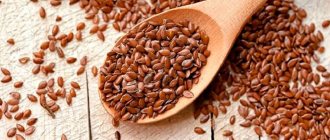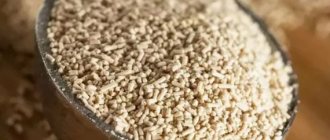Back to list Previous article Next article
21.06.2021
Tags:
useful, flax seeds
5/5 — (1 vote)
Flaxseed is a plant food that contains healthy fats, antioxidants, and fiber. Some call it a "functional food." This means that a person can use it to improve their health.
People grew flax as a crop in ancient Egypt and China. In Asia, it has been used in Ayurvedic medicine for thousands of years.
Today, flaxseed is available in the form of seeds, oil, powder, tablets, capsules and flour. People use it as a dietary supplement to prevent constipation, diabetes, high cholesterol, heart disease, cancer and several other diseases.
Nutrients in flaxseed include:
- lignans,
- antioxidants,
- fiber,
- protein and polyunsaturated fatty acids such as alpha-linolenic acid (ALA), or omega-3.
Consuming these nutrients can help reduce your risk of developing various diseases.
However, there is currently insufficient evidence to support all of these hypotheses. Let's look at what research says about flaxseed and its possible benefits.
Possible beneficial properties of flax
Flaxseed contains several nutrients that may have various health benefits.
Like other plant foods, flaxseed is rich in antioxidants. They can help prevent disease by removing molecules called free radicals from the body. They arise as a result of natural processes and environmental influences. If there are too many free radicals in the body, oxidative stress can develop, which leads to cell damage and disease. Antioxidants help remove free radicals from the body.
Flaxseed is a good source of lignans, which have antioxidant properties. According to some scientists, flaxseed may be more than 800 times richer in lignans than most other foods.
The following sections take a closer look at the possible benefits of flaxseed.
Reducing the risk of cancer
Flaxseed contains omega-3 fatty acids. Research shows that they may help prevent the growth of various types of cancer cells. One 2013 study found a lower incidence of breast cancer among women who regularly consumed flaxseed.
Additionally, in 2021, the review authors concluded that flaxseed may help reduce the risk of developing breast cancer after menopause.
Lignans are a type of phytoestrogens, which are plant-derived nutrients that act similarly to estrogen. There was previously concern that phytoestrogens might increase the risk of breast cancer, but recent research suggests they play a protective role.
Normalize cholesterol levels and improve heart health
The American Heart Association (AHA) recommends eating more fiber and omega-3s to promote heart health. Lignans may also help prevent cardiovascular disease. Flaxseed contains all of these nutrients.
Flaxseed also contains phytosterols. They are similar in structure to cholesterol, but they help prevent cholesterol from being absorbed in the intestines.
Therefore, consuming phytosterols may help lower the levels of low-density lipoprotein (LDL), or “bad” cholesterol, in the body.
In 2010, researchers studied the effect of flaxseed on cholesterol levels in men. Participants took a 20 mg lignan capsule, a 100 mg capsule, or a placebo for 12 weeks. After taking lignans, cholesterol levels decreased, especially in those who took the 100 mg capsules.
Researchers in a 2012 study of 17 people found that eating flaxseed lowered cholesterol and helped the body eliminate fat, although they noted that overall diet may also play a role. A team of researchers suggested that flaxseed may be beneficial for lowering cholesterol levels.
Some scientists have also linked omega-3 oils, commonly found in fatty fish, to reduced cardiovascular risk. The researchers suggested that flaxseed could provide an alternative to marine sources of omega-3s.
Relieving Arthritis Symptoms
According to the Arthritis Foundation, flaxseed may help reduce joint pain and stiffness . Some people take it for rheumatoid arthritis, lupus, and Raynaud's phenomenon.
Reducing hot flashes
In 2007, a group of scientists published results suggesting that flaxseed may help reduce the frequency or severity of hot flashes in women not using estrogen therapy during menopause.
However, in 2012, following further research, the same group of scientists concluded that flaxseed actually had no effect.
Increased blood sugar levels
Lignans and other phytoestrogens may help reduce the risk of developing chronic diseases such as diabetes.
In 2013, scientists gave 25 people 0g, 13g, or 26g of flaxseed every day for 12 weeks. Participants had prediabetes and were either obese or overweight men or women who had experienced menopause.
The 13 g dose was found to reduce glucose and insulin levels and improve insulin sensitivity, while other doses had no such effect.
Additionally, a 2021 study in rodents found that compounds found in flaxseed may help reduce the incidence of type 1 diabetes and delay the onset of type 2 diabetes. However, these results may not apply to humans.
That same year, 99 people with prediabetes took 40g or 20g of flaxseed or no flaxseed and a placebo every day for 12 weeks. Eating flaxseed was found to lower blood pressure, but did not improve blood sugar levels or insulin resistance.
The benefits of flaxseed for diabetes symptoms remain unclear.
Preventing constipation
Flaxseed is a good source of insoluble fiber, which does not dissolve in water but remains in the digestive tract after eating. There it absorbs water and expands in volume, which can facilitate regular food intake.
However, the National Center for Complementary and Integrative Health (NCCIH) says there is little evidence that flaxseed helps relieve constipation.
The NCCIH adds that eating flaxseed with a little water can worsen constipation and lead to intestinal blockage.
Additionally, too much flaxseed or flaxseed oil can cause diarrhea.
Reducing exposure to radiation
In 2013, scientists found evidence that dietary lignans from flaxseed help mice recover from radiation exposure.
Rodents that consumed lignans had lower levels of organ inflammation, oxidative damage and fibrosis, as well as higher survival rates compared to those that did not consume them.
If further human trials show similar results, flaxseed lignans could help treat lung problems after radiation or radiotherapy.
Other diseases
currently funding research to find out if the nutrients found in flaxseed can help with:
- ovarian cancer;
- cardiovascular diseases;
- metabolic syndrome
- diabetes;
- asthma;
- inflammation of organs.
Uses of flaxseed in Ayurvedic medicine include:
- strengthening general health;
- restoration of skin pH balance;
- prevention of chronic diseases such as diabetes, atherosclerosis and arthritis;
- providing protection against cancer.
Features of the composition
Some people confuse flax seeds with dill. But they are lighter in color and have a denser shell, and are not at all spicy, and if you chew them for a long time, they taste like nuts. Flax seeds can be purchased at any health food store or specialty market. They are also sold in pharmacies.
The composition is rich. The macronutrients of these seeds are proteins, fats and carbohydrates. Vegetable proteins are not complete in amino acid composition, but contain a sufficient amount of amino acids to be taken into account in the overall matrix of proteins in human nutrition. Flax seed porridge is considered a preferred protein food for vegetarians, and adding these seeds to your diet during fasting can help you stay healthy.
Plant proteins allow you to diversify the amino acid composition of food, promote faster muscle recovery after physical activity and help strengthen the immune system. Without additional sources of protein, food will be monotonous and quite expensive. The less meat, fish and eggs in the diet, the more flax seeds, flaxseed flour and meal there should be.
The fats in flax seeds are poly and monounsaturated fatty acids omega 3 and omega 6. They improve redox processes in the body and promote faster fat burning. It's about omega 3 that you need to eat more fat to lose weight. In addition, omega 3 protects the walls of blood vessels from the deposition of cholesterol plaques and helps maintain normal blood circulation. They are considered a key product for the prevention of atherosclerosis, heart attack and stroke. These fats help maintain the health of the reproductive system. They are recommended to eat to maintain hormonal balance, as well as to strengthen hair, nails, and skin.
The carbohydrates in flax seeds are complex. They do not cause rapid weight gain and are not “converted into fat,” as you can read in various popular sources. This type of carbohydrate is slowly converted into energy and helps normalize all metabolic processes in the human body. Complex carbohydrates help keep your energy levels high throughout the day and allow you to lead an active lifestyle. This is important for both those trying to lose weight and athletes.
In addition, flax seeds contain:
- Soluble and insoluble fiber;
- B vitamins;
- Antioxidant vitamins A, C, E, PP;
- Various minerals - phosphorus, potassium, zinc, calcium, iron and selenium;
- Phytosterols are plant analogues of human sex hormones;
- Alkaloids – volatile ethers
The calorie content of the seeds is 540 kcal per 100 g, but they can be included in the diet for weight loss. It's all about the small volume of product consumed and high nutritional value. A person gets health benefits from just 1 teaspoon of these seeds.
Nutritional value of flaxseed
According to the USDA, a 7-gram tablespoon of ground flaxseed contains:
- energy: 37.4 calories
- protein: 1.28 g
- fat: 2.95 g
- carbohydrates: 2.02 g
- fiber: 1.91 g
- calcium: 17.8 mg
- magnesium: 27.4 mg
- phosphorus: 44.9 mg
- potassium: 56.9 mg
- folate: 6.09 micrograms (mcg)
- lutein and zeaxanthin: 45.6 mcg
A teaspoon of flaxseed also contains traces of various vitamins and minerals, but not in significant quantities. It also contains lignans, tryptophan, lysine, tyrosine and valine, as well as healthy fats, mostly unsaturated.
People should try to avoid whole flaxseed and consume it in ground form, as the intestines may not be able to absorb the nutrients contained in whole flaxseed.
Chemical composition of raw flax seeds
Nutritional value (per 100 grams of unprocessed seeds) [6]
| Calorie content | 534 kcal |
| Squirrels | 18.3 g |
| Fats | 42.2 g |
| Carbohydrates | 28.9 g |
| Alimentary fiber | 27.3 g |
| Water | 6.96 g |
Vitamin composition (in milligrams per 100 grams of untreated seeds)
| Thiamine (B1) | 1,644 |
| Riboflavin (B2) | 0,161 |
| Choline (B4) | 78,7 |
| Pantothenic acid (B5) | 0,985 |
| Pyridoxine (B6) | 0,473 |
| Folic acid (B9) | 87 |
| Ascorbic acid (C) | 0,6 |
| Tocopherol (E) | 0,31 |
| Phylloquinone (K) | 0,0043 |
| Nicotinic acid (PP) | 3,08 |
Nutrient balance (in milligrams per 100 grams of raw seeds)
| Macronutrients | |
| Potassium (K) | 813 |
| Calcium (Ca) | 255 |
| Magnesium (Mg) | 392 |
| Sodium (Na) | 30 |
| Phosphorus (P) | 642 |
| Microelements | |
| Iron (Fe) | 5730 |
| Manganese (Mn) | 2482 |
| Copper (Cu) | 1220 |
| Selenium (Se) | 25,4 |
| Zinc (Zn) | 4340 |
Risks
The nutrients contained in flaxseed may not be beneficial for everyone. People should avoid flaxseed products or consult a doctor first if they:
- use blood thinners such as warfarin (Coumadin) or aspirin;
- use non-steroidal anti-inflammatory drugs;
- take cholesterol-lowering medications;
- have hormone-sensitive breast or uterine cancer;
- are pregnant or breastfeeding;
- suffer from an allergy to flaxseed.
In general, people who eat flaxseed should avoid raw and unripe flaxseeds, as they may contain toxic compounds. Consume flaxseed ground and with plenty of liquid to prevent digestive problems.
Buy only small bottles of flaxseed oil in dark bottles and store them in the refrigerator, as the oil can spoil quickly. Also, do not use oil after the expiration date stated on the label.
Avoid heating flaxseed oil when cooking. Add oil to already prepared dishes and do not heat it in the microwave.
Flax seeds and contraindications for their use
In addition to pancreatitis, cholecystitis, and exacerbation of inflammatory diseases of the mucous membranes of the digestive organs, lactation may be a contraindication. The nutrition of a nursing mother should be selective and careful. You should not introduce new products, especially if your baby has had allergies. Sometimes allergies also occur to flax seeds. Those whose children are allergic to nuts are especially at risk. It is best to exclude flax seed for the entire lactation period. However, according to other sources, the product is hypoallergenic and should not be removed from the diet when feeding a child. One way or another, you need to consult with your doctor, pediatrician and allergist.
Diet Tips
Flaxseed can be consumed ground, in oil form, or in capsules.
It is also found in ready-to-eat foods such as muffins and other baked goods, pasta, snack bars and alternative milks.
Ground flaxseed can be added to:
- breakfast cereals,
- smoothie,
- soups and stews,
- salads and sandwiches,
- yoghurts.
You can also add a spoonful of flaxseed to the muffin mixture or use it to coat chicken instead of breadcrumbs.
However, too much flaxseed can give the food a bitter taste, which some people may not like. One solution is to start with a small amount and gradually add to taste.
Introduction
As the popularity of a healthy lifestyle grew, a fashion for eating flax seeds appeared.
It is interesting to know that our ancestors also resorted to using this plant to strengthen the body. Are flax seeds really that good? This and much more will be discussed in this article. We will look at how to use them correctly so as not to harm the intestines, find out whether the product really fights extra pounds and helps a person overcome the feeling of hunger.
Can flaxseed oil be used in cooking or in salads?
Flaxseed oil can be used in cooking as long as it is not heated. It is best to add it to already prepared dishes and not heat it in the microwave. This is because heating the oil causes it to break down into a potentially harmful form. Flaxseed oil can be used to make salad dressings, but it can quickly go bad. Store it in the refrigerator in a dark-colored bottle and do not use it after the expiration date.
Back to list Previous article Next article
How to eat flaxseed correctly?
Now let's talk about all the intricacies of eating seeds. After all, it is important not just to eat them, but to get as much as possible everything that this seed is useful for.
So, the seeds can be eaten whole:
- fry, prepare flax crackers (fraks);
- add to dishes: sprinkle on porridge, soups, smoothies, fermented milk products or season vegetable and fruit salads, as well as baked and boiled vegetables.
But it is still more correct and healthier to eat ground seeds in their raw form.
It is important to destroy the hard shell of the grain so that the nutrients can be fully absorbed and have their beneficial effect.
Remember that ground seeds do not need heat treatment and it is advisable to use them fresh, that is, immediately after grinding.
With the help of ground flax grain, you can improve your usual home recipes:
- thicken cocktails, soups, sauces and vegetable stews;
- add it to baked goods, inside cutlets and as a breading;
- make candy and use it instead of eggs in kneading dough for sweet baked goods.
Here is a recipe for a mixture with a texture very similar to egg white and replacing one chicken egg. Mix 1 tbsp in a large bowl. l. flaxseed flour with 3 tbsp. l. water and heat in microwave until boiling (about 30 seconds).
Fruit flax smoothie recipe
It's good to start the day with a vitamin cocktail. Here's a great recipe:
- 0.5 tbsp. orange juice
- 0.5 tbsp. water
- 150 g tofu cheese
- 0.5 tbsp. soy milk
- 2 tbsp. l. flaxseed flour
- 1 banana
- 1 tbsp. frozen blueberries or strawberries.
Beat all ingredients in a blender until smooth. You will get 4 tbsp. drink If you don’t have any ingredient, replace it with something else, and you can also use regular milk.
Once again I draw your attention to the fact that it is recommended to use 2 tbsp. l. (20 g) seeds per day. Although there is an opinion that 50 g will not hurt, you just need to divide it into two doses: morning and evening.
Creating compresses
You can make compresses from flax seeds. They relieve pain, soften boils and abscesses. Here is the prescription:
The ground flax seed is placed in a gauze bag, which is immersed in hot water for 10 minutes, after which the bag is applied to the sore spot.
You can also use mucus for stomach ulcers, gastritis and enteritis.
1 tbsp. l. pour uncrushed flaxseeds into 2 cups of hot water and leave for 1 hour. Shake periodically and then strain. Use before meals for diseases of the gastrointestinal tract.
For hemorrhoids, 1/5 cup can also be used as a therapeutic enema of flaxseed mucus. Naturally, it should be slightly warmed up. After the enema you need to lie down in bed for 1 hour.
Flaxseed Cookies
You can also make cookies with flaxseed. In general, there are many recipes. I'll give you one, but a very useful one. There will be no flour or sugar here.
Here are the ingredients:
- 1 cup oatmeal
- flax and chia seeds
- 2 bananas
Take bananas and peel them. Next, crush them on a board with a spoon or fork until a paste appears.
Transfer the finished porridge to a separate bowl. Then unload oatmeal, some chia and flax seeds on top. Then we mix everything.
Next, place the foil on the board from the oven. Then take the resulting mixture with a tablespoon and place it on this foil.
At the same time, use a spoon to make the correct molds in the form of small cakes. When the entire mixture is placed on foil, then the resulting cakes are placed in the oven for 15 minutes.










